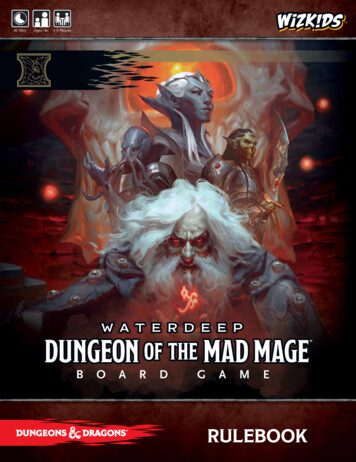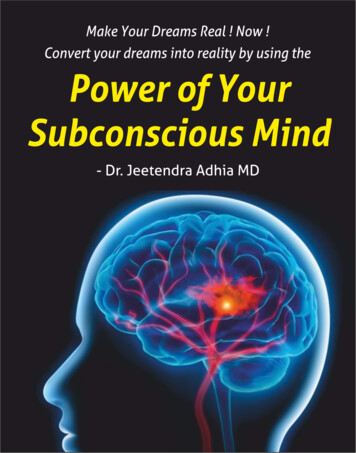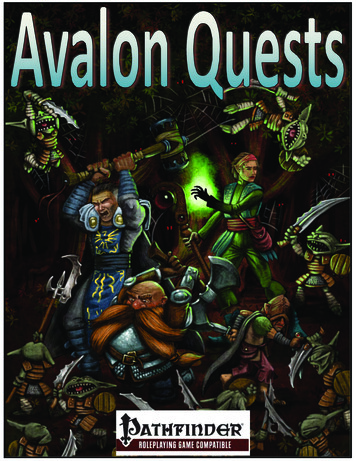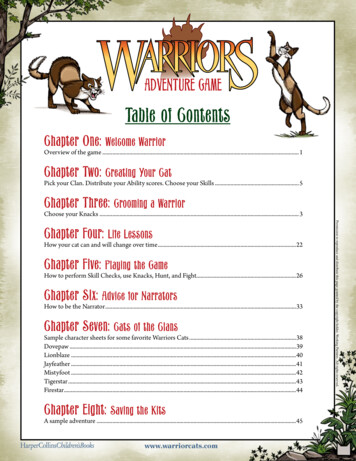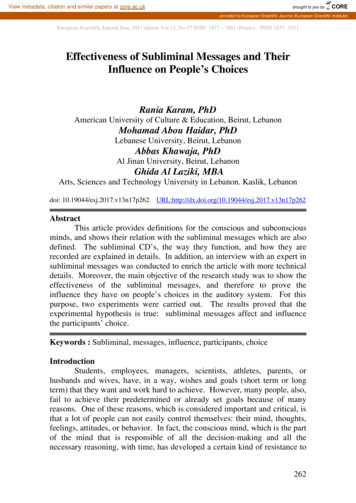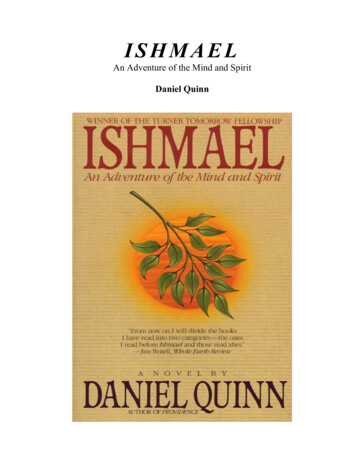
Transcription
ISHMAELAn Adventure of the Mind and SpiritDaniel Quinn
of the air. They neither sow nor reap nor gather into barns, but God takes perfect care of them.Don’t you think he’ll do the same for you?’ In our culture the overwhelming answer to that questionis, ‘Hell no!’ Even the most dedicated monastics saw to their sowing and reaping and gathering intobarns.”“What about Saint Francis?”“Saint Francis relied on the bounty of farmers, not the bounty of God. Even the most fundamentalof the fundamentalists plug their ears when Jesus starts talking about birds of the air and lilies of thefield. They know damn well he’s just yarning, just making pretty speeches.”“So you think this is what’s at the root of your revolution. You wanted and still want to have yourlives in your own hands.”“Yes. Absolutely. To me, living any other way is almost inconceivable. I can only think thathunter–gatherers live in a state of utter and unending anxiety over what tomorrow’s going to bring.”“Yet they don’t. Any anthropologist will tell you that. They are far less anxiety–ridden than you are.They have no jobs to lose. No one can say to them, ‘Show me your money or you don’t get fed,don’t get clothed, don’t get sheltered.’ ”“I believe you. Rationally speaking, I believe you. But I’m talking about my feelings, about myconditioning. My conditioning tells me—Mother Culture tells me—that living in the hands of thegods has got to be a never–ending nightmare of terror and anxiety.”“And this is what your revolution does for you: It puts you beyond the reach of that appallingnightmare. It puts you beyond the reach of the gods.”“Yes, that’s it.”“So. We have a new pair of names for you. The Takers are those who know good and evil, and theLeavers are . . . ?”“The Leavers are those who live in the hands of the gods.”TWELVE1Along about three o’clock, the rain stopped and the carnival yawned, stretched, and went back towork separating the rubes from their money. At loose ends once again, I hung around for a while,let myself be separated from a few bucks, and finally had the idea of tracking down Ishmael’sowner. This turned out to be a hard–eyed black man named Art Owens, who was five and a half feetVTN140
tall and spent more time lifting weights than I do at the typewriter. I told him I was interested inbuying his gorilla.“Is that a fact,” he said, not scornful, not impressed, not interested, not anything.I told him it was and asked how much it would take.“Would take about three thousand.”“I’m not that interested.”“How interested are you?” Just curious, not seriously interested himself.“Well, more like a thousand.”He sneered—just a little, almost politely. For some reason, I liked this guy. He was the type whohas a law degree from Harvard stuck away in a drawer somewhere because he never found anythingto do with it that appealed to him.I told him: “This is a very, very old animal, you know. He’s been here since the thirties.”This got his attention. He asked how I happened to come by that piece of information.“I know the animal,” I replied briefly, as if I might know thousands more like him.“Might go twenty–five hundred,” he said.“Trouble is, I don’t have twenty–five hundred.”“See, I already got a painter in New Mexico workin’ on a sign for me,” he said. “Paid him twohundred in advance.”“Uh huh. I could probably raise fifteen hundred.”“Don’t see how I could go below twenty–two, that’s a fact.”The fact was, if it was right there in my hand, he’d be delighted to take two thousand. Maybe eveneighteen hundred. I said I’d think about it.2It was a Friday night, so the suckers didn’t start going home till after eleven and my senectuousbribee didn’t come round to collect his twenty dollars till midnight. Ishmael was asleep sitting up,still bundled up in his blankets, and I didn’t feel any qualms about waking him; I wanted him toreassess the charms of the independent life.VTN141
He yawned, sneezed twice, cleared his throat of a mass of phlegm, and fixed me in a bleary,malevolent glare.“Come back tomorrow,” he said in the equivalent of a mental croak.“Tomorrow’s Saturday—hopeless.”He wasn’t happy about it, but he knew I was right. He managed to put off the inevitable bylaboriously rearranging himself, his cage, and his blankets. Then he settled down and gave me alook of loathing.“Where did we leave off?”“We left off with a new pair of names for the Takers and the Leavers: Those who know good andevil and those who live in the hands of the gods.”He grunted.3“What happens to people who live in the hands of the gods?”“What do you mean?”“I mean, what happens to people who live in the hands of the gods that does not happen to peoplewho build their lives on the knowledge of good and evil?”“Well, let’s see,” I said. “I don’t suppose this is what you’re getting at, but this is what comes tomind. People who live in the hands of the gods don’t make themselves rulers of the world and forceeveryone to live the way they live, and people who know good and evil do.”“You’ve turned the question round back to front,” said Ishmael. “I asked what happens to peoplewho live in the hands of the gods that doesn’t happen to those who know good and evil, and youtold me just the opposite: what doesn’t happen to people who live in the hands of the gods that doeshappen to those who know good and evil.”“You mean you’re looking for something positive that happens to people who live in the hands ofthe gods.”“That’s right.”“Well, they do tend to let the people around them live the way they want to live.”“You’re telling me something they do, not something that happens to them. I’m trying to focus yourattention on the effects of this life–style.”VTN142
“I’m sorry. I’m afraid I just don’t know what you’re getting at.”“You do, but you’re not used to thinking about it in these terms.”“Okay.”“You remember the question we started out to answer when you arrived this afternoon: How didman become man? We’re still after the answer to that question.”I groaned, fully and frankly.“Why do you groan?” Ishmael asked.“Because questions of that generality intimidate me. How did man become man? I don’t know. Hejust did it. He did it the way birds became birds and the way that horses became horses.”“Exactly so.”“Don’t do that to me,” I told him.“Evidently you don’t understand what you just said.”“Probably not.”“I’ll try to clarify it for you. Before you were Homo, you were what?”“Australopithecus.”“Good. And how did Australopithecus become Homo?”“By waiting.”“Please. You’re here to think.”“Sorry.”“Did Australopithecus become Homo by saying, ‘We know good and evil as well as the gods, sothere’s no need for us to live in their hands the way rabbits and lizards do. From now on we willdecide who lives and who dies on this planet, not the gods.’ ”“No.”“Could they have become man by saying that?”“No.”“Why not?”VTN143
“Because they would have ceased to be subject to the conditions under which evolution takesplace.”“Exactly. Now you can answer the question: What happens to people—to creatures in general—who live in the hands of the gods?”“Ah. Yes, I see. They evolve.”“And now you can answer the question I posed this morning: How did man become man?”“Man became man by living in the hands of the gods.”“By living the way the Bushmen of Africa live.”“That’s right.”“By living the way the Kreen–Akrore of Brazil live.”“Right again.”“Not the way Chicagoans live?”“No.”“Or Londoners?”“No.”“So now you know what happens to people who live in the hands of the gods.”“Yes. They evolve.”“Why do they evolve?”“Because they’re in a position to evolve. Because that’s where evolution takes place. Pre–manevolved into early man because he was out there competing with all the rest. Pre–man evolved intoearly man because he didn’t take himself out of the competition, because he was still in the placewhere natural selection is going on.”“You mean he was still a part of the general community of life.”“That’s right.”“And that’s why it all happened—why Australopithecus became Homo habilis and why Homohabilis became Homo erectus and why Homo erectus became Homo sapiens and why Homosapiens became Homo sapiens sapiens.”“Yes.”VTN144
“And then what happened?”“And then the Takers said, ‘We’ve had enough of living in the hands of the gods. No more naturalselection for us, thanks very much.’ ”“And that was that.”“And that was that.”“You remember I said that to enact a story is to live so as to make it come true.”“Yes.”“According to the Taker story, creation came to an end with man.”“Yes. So?”“How would you live so as to make that come true? How would you live so as to make creationcome to an end with man?”“Oof. I see what you mean. You would live the way the Takers live. We’re definitely living in away that’s going to put an end to creation. If we go on, there will be no successor to man, nosuccessor to chimpanzees, no successor to orangutans, no successor to gorillas—no successor toanything alive now. The whole thing is going to come to an end with us. In order to make their storycome true, the Takers have to put an end to creation itself—and they’re doing a damned good job ofit.”4“When we began and I was trying to help you find the premise of the Taker story, I told you that theLeaver story has an entirely different premise.”“Yes.”“Perhaps you’re ready to articulate that premise now.”“I don’t know. At the moment I can’t even think of the Taker premise.”“It’ll come back to you. Every story is a working out of a premise.”“Yes, okay. The premise of the Taker story is the world belongs to man.” I thought for a couple ofminutes, then I laughed. “It’s almost too neat. The premise of the Leaver story is man belongs to theworld.”“Meaning what?”VTN145
“Meaning—” I barked a laugh. “It’s really too much.”“Go on.”“It means that, right from the beginning, everything that ever lived belonged to the world—andthat’s how things came to be this way. Those single–celled creatures that swam in the ancientoceans belonged to the world, and because they did, everything that followed came into being.Those club–finned fish offshore of the continents belonged to world, and because they did, theamphibians eventually came into being. And because the amphibians belonged to the world, thereptiles eventually came into being. And because the reptiles belonged to the world, the mammalseventually came into being. And because the mammals belonged to the world, the primateseventually came into being. And because the primates belonged to the world, Australopithecuseventually came into being. And because Australopithecus belonged to the world, man eventuallycame into being. And for three million years man belonged to the world—and because he belongedto the world, he grew and developed and became brighter and more dexterous until one day he wasso bright and dexterous that we had to call him Homo sapiens sapiens, which means that he wasus.”“And that’s the way the Leavers lived for three million years—as if they belonged to the world.”“That’s right. And that’s how we came into being.”5Ishmael said, “We know what happens if you take the Taker premise, that the world belongs toman.”“Yes, that’s a disaster.”“And what happens if you take the Leaver premise, that man belongs to the world?”“Then creation goes on forever.”“How does that sound?”“It has my vote.”6“Something occurs to me,” I said.“Yes?”VTN146
“It occurs to me that the story I just told is in fact the story the Leavers have been enacting here forthree million years. The Takers’ story is, ‘The gods made the world for man, but they botched thejob, so we had to take matters into our own, more competent hands.’ The Leavers’ story is, ‘Thegods made man for the world, the same way they made salmon and sparrows and rabbits for theworld; this seems to have worked pretty well so far, so we can take it easy and leave the running ofthe world to the gods.’ ”“That’s right. There are other ways to tell it, just as there are other ways to tell the story of theTakers, but this way of telling it is as good as any.”I sat there for a while. “I’m thinking about . . . the meaning of the world, divine intentions in theworld, and the destiny of man. According to this story.”“Go ahead.”“The meaning of the world . . . I think the third chapter of Genesis had it right. It’s a garden—thegods’ garden. I say this even though I myself very much doubt that gods have anything to do with it.I just find this a wholesome and encouraging way to think of it.”“I understand.”“And there are two trees in the garden, one for the gods and one for us. The one for them is the Treeof the Knowledge of Good and Evil, and the one for us is the Tree of Life. But we can only find theTree of Life if we stay in the garden—and we can only stay in the garden if we keep our hands offthe gods’ tree.”Ishmael gave me a nod of encouragement.“Divine intentions . . . It would seem . . . There is a sort of tendency in evolution, wouldn’t you say?If you start with those ultrasimple critters in the ancient seas and move up step by step to everythingwe see here now—and beyond—then you have to observe a tendency toward . . . complexity. Andtoward self–awareness and intelligence. Wouldn’t you agree?”“Yes.”“That is, all sorts of creatures on this planet appear to be on the verge of attaining that self–awareness and intelligence. So it’s definitely not just humans that the gods are after. We were nevermeant to be the only players on this stage. Apparently the gods intend this planet to be a gardenfilled with creatures that are self–aware and intelligent.”“So it would appear. And if this is so, then man’s destiny would seem to be plain.”“Yes. Amazingly enough, it is plain—because man is the first of all these. He’s the trailblazer, thepathfinder. His destiny is to be the first to learn that creatures like man have a choice: They can tryto thwart the gods and perish in the attempt—or they can stand aside and make some room for allthe rest. But it’s more than that. His destiny is to be the father of them all—I don’t mean by directdescent. By giving all the rest their chance—the whales and the dolphins and the chimps and theVTN147
raccoons—he becomes in some sense their progenitor. . . . Oddly enough, it’s even grander than thedestiny the Takers dreamed up for us.”“How so?”“Just think. In a billion years, whatever is around then, whoever is around then, says, ‘Man? Oh yes,man! What a wonderful creature he was! It was within his grasp to destroy the entire world and totrample all our futures into the dust—but he saw the light before it was too late and pulled back. Hepulled back and gave the rest of us our chance. He showed us all how it had to be done if the worldwas to go on being a garden forever. Man was the role model for us all!’ ”“Not a shabby destiny.”“Not a shabby destiny by any means. And it occurs to me that this . . .”“Yes?”“This gives a little shape to the story. The world is a very, very fine place. It wasn’t a mess. It didn’tneed to be conquered and ruled by man. In other words, the world doesn’t need to belong to man—but it does need man to belong to it. Some creature had to be the first to go through this, had to seethat there were two trees in the garden, one that was good for gods and one that was good forcreatures. Some creature had to find the way, and if that happened, then . . . there was just no limitto what could happen here. In other words, man does have a place in the world, but it’s not his placeto rule. The gods have that in hand. Man’s place is to be the first. Man’s place is to be the firstwithout being the last. Man’s place is to figure out how it’s possible to do that—and then to makesome room for all the rest who are capable of becoming what he’s become. And maybe, when thetime comes, it’s man’s place to be the teacher of all the rest who are capable of becoming what he’sbecome. Not the only teacher, not the ultimate teacher. Maybe only the first teacher, thekindergarten teacher—but even that wouldn’t be too shabby. And do you know what?”“What?”“All along, I’ve been saying to myself, ‘Yes, this is all very interesting, but what good is it? Thisisn’t going to change anything!’ ”“And now?”“This is what we need. Not just stopping things. Not just less of things. People need somethingpositive to work for. They need a vision of something that . . . I don’t know. Something that . . .”“I think what you’re groping for is that people need more than to be scolded, more than to be madeto feel stupid and guilty. They need more than a vision of doom. They need a vision of the worldand of themselves that inspires them.”“Yes. Definitely. Stopping pollution is not inspiring. Sorting your trash is not inspiring. Cuttingdown on fluorocarbons is not inspiring. But this . . . thinking of ourselves in a new way, thinking ofthe world in a new way . . . This . . .”VTN148
I let it go. What the hell, he knew what I was trying to say.7“I trust you now see a point I made when we first began. The story being enacted here by the Takersis not in any sense chapter two of the story that was being enacted here during the first three millionyears of human life. The Leaver story has its own chapter two.”“What is its chapter two?”“You’ve just outlined it, haven’t you?”“I’m not sure.”Ishmael spent a moment in thought. “We’ll never know what the Leavers of Europe and Asia wereup to when the people of your culture came along to plow them under forever. But we do knowwhat they were up to here in North America. They were looking for ways to achieve settlement thatwere in accord with the way they’d always lived, ways that left room for the rest of life to go onaround them. I don’t mean that they did this out of any sense of high–mindedness. I simply meanthat it didn’t occur to them to take the life of the world into their own hands and to declare war onthe rest of the community of life. Proceeding in this way for another five thousand years or tenthousand years, a dozen civilizations might have appeared on this continent as sophisticated asyours is now, each with its own values and objectives. It’s not unthinkable.”“No, it’s not. Or rather, yes it is. According to Taker mythology, every civilization anywhere in theuniverse must be a Taker civilization, a civilization in which people have taken the life of the worldinto their own hands. That’s so obvious it doesn’t need to be pointed out. Hell, every aliencivilization in the history of science fiction has been a Taker civilization. Every civilization everencountered by the U.S.S. Enterprise has been a Taker civilization. This is because it goes withoutsaying that any intelligent creature anywhere will insist on taking his life out of the hands of thegods, will know that the world belongs to him and not the other way around.”“True.”“Which raises an important question in my mind. What exactly would it mean to belong to theworld at this point? Obviously you’re not saying that only hunter–gatherers truly belong to theworld.”“I’m glad you see that. Though if the Bushmen of Africa or the Kalapalo of Brazil (if there are anyleft by now) want to go on living that way for the next ten million years, I can’t see how this can beanything less than beneficial for them and for the world.”“True. But that doesn’t answer my question. How can civilized people belong to the world?”VTN149
Ishmael shook his head in what looked like a mixture of impatience and exasperation. “Civilizedhas nothing to do with it. How can tarantulas belong to the world? How can sharks belong to theworld?”“I don’t understand.”“Look around you and you’ll see some creatures who act as though the world belongs to them andsome creatures who act as though they belong to the world. Can you tell them apart?”“Yes.”“The creatures who act as though they belong to the world follow the peace–keeping law, andbecause they follow that law, they give the creatures around them a chance to grow towardwhatever it’s possible for them to become. That’s how man came into being. The creatures aroundAustralopithecus didn’t imagine that the world belonged to them, so they let him live and grow.How does being civilized come into it? Does being civilized mean that you have to destroy theworld?”“No.”“Does being civilized make you incapable of giving the creatures around you a little space in whichto live?”“No.”“Does it make you incapable of living as harmlessly as sharks and tarantulas and rattlesnakes?”“No.”“Does it make you incapable of following a law that even snails and earthworms manage to followwithout any difficulty?”“No.”“As I pointed out some time ago, human settlement isn’t against the law, it’s subject to the law—and the same is true of civilization. So what exactly is your question?”“I don’t know, now. Obviously belonging to the world means . . . belonging to the same club aseveryone else. The club being the community of life. It means belonging to the club and followingthe same rules as everyone else.”“And if being civilized means anything at all, it should mean that you’re leaders of the club, not itsonly criminals and destroyers.”“True,” I said, then sat there blinking for a few moments. “Something you said a moment ago.We’ll never know what the Leavers of Europe or Asia were up to when the people of my culturearrived to plow them under.”VTN150
“Yes?”“I think some information about that has been dug up in recent years.”Ishmael nodded. “If it’s recent, then I might well not have heard of it.”“An archeologist named Riane Eisler wrote about a widespread Leaver agricultural society thatexisted in Europe until it was overrun by the Takers five or six thousand years ago. Except shedidn’t call them Leavers and Takers, of course. I don’t know a lot about it, but evidently the culturethe Takers plowed under was based on goddess worship.”Ishmael nodded. “One of my students was aware of the book you’re talking about but was unable toexplain its significance as you’ve done. It’s called, I believe, The Chalice and the Blade.”8“Returning to the subject of inspiration, it seems to me that these days you have another promisingsource of it,” Ishmael said.“What’s that?”“All my other pupils, when they reached this point, said, ‘Yes, yes, this is wonderful—but peopleare not going to relinquish their hold on the world. It just can’t happen. Never. Not in a thousandyears.’ And I had nothing I could point to as a hopeful example to the contrary. Now I do.”It took me about ninety seconds to see it. “I assume you mean what’s been happening in the SovietUnion and eastern Europe in the past few years.”“That’s right. Ten years ago, twenty years ago, anyone predicting that Marxism would soon bedismantled from the top would have been labeled a hopeless visionary, an utter fool.”“Yes, that’s true.”“But once the people of these countries were inspired by the possibility of a new way of life, thedismantling took place almost overnight.”“Yes, I see what you mean. Five years ago I would have said that no amount of inspiration couldaccomplish that—or this.”“And now?”“And now it’s just barely thinkable. Improbable as hell but not unimaginable.”9VTN151
“But I do have another question,” I added.“Proceed.”“Your ad said, ‘Must earnestly desire to save the world.’ ”“Yes?”“What do I do if I earnestly desire to save the world?”Ishmael frowned at me through the bars for a long moment. “You want a program?”“Of course I want a program.”“Then here is a program: The story of Genesis must be reversed. First, Cain must stop murderingAbel. This is essential if you’re to survive. The Leavers are the endangered species most critical tothe world—not because they’re humans but because they alone can show the destroyers of theworld that there is no one right way to live. And then, of course, you must spit out the fruit of thatforbidden tree. You must absolutely and forever relinquish the idea that you know who should liveand who should die on this planet.”“Yes, I see all that, but that’s a program for mankind, that’s not a program for me. What do I do?”“What you do is to teach a hundred what I’ve taught you, and inspire each of them to teach ahundred. That’s how it’s always done.”“Yes, but . . . is it enough?”Ishmael frowned. “Of course it’s not enough. But if you begin anywhere else, there’s no hope at all.You can’t say, ‘We’re going to change the way people behave toward the world, but we’re notgoing to change the way they think about the world or the way they think about divine intentions inthe world or the way they think about the destiny of man.’ As long as the people of your culture areconvinced that the world belongs to them and that their divinely–appointed destiny is to conquerand rule it, then they are of course going to go on acting the way they’ve been acting for the past tenthousand years. They’re going to go on treating the world as if it were a piece of human propertyand they’re going to go on conquering it as if it were an adversary. You can’t change these thingswith laws. You must change people’s minds. And you can’t just root out a harmful complex of ideasand leave a void behind; you have to give people something that is as meaningful as what they’velost—something that makes better sense than the old horror of Man Supreme, wiping out everythingon this planet that doesn’t serve his needs directly or indirectly.”I shook my head. “What you’re saying is that someone has to stand up and become to the world oftoday what Saint Paul was to the Roman Empire.”“Yes, basically. Is that so daunting?”I laughed. “Daunting isn’t nearly strong enough. To call it daunting is like calling the Atlanticdamp.”VTN152
“Is it really so impossible in an age when a stand–up comic on television reaches more people in tenminutes than Paul did in his entire lifetime?”“I’m not a stand–up comic.”“But you’re a writer, aren’t you?”“Not that kind of writer.”Ishmael shrugged. “Lucky you. You are absolved of any obligation. Self–absolved.”“I didn’t say that.”“What were you expecting to learn from me? An incantation? A magic word that would sweep allthe nastiness away?”“No.”“Ultimately, it would seem you’re no different from those you profess to despise: You just wantedsomething for yourself. Something to make you feel better as you watch the end approach.”“No, it isn’t that. You just don’t know me very well. It’s always this way with me—first I say, ‘No,no, it’s impossible, completely and utterly impossible,’ then I go ahead and do it.”Ishmael humphed, barely mollified.“One thing I know people will say to me is ‘Are you suggesting we go back to being hunter–gatherers?’ ”“That of course is an inane idea,” Ishmael said. “The Leaver life–style isn’t about hunting andgathering, it’s about letting the rest of the community live—and agriculturalists can do that as wellas hunter–gatherers.” He paused and shook his head. “What I’ve been at pains to give you is a newparadigm of human history. The Leaver life is not an antiquated thing that is ‘back there’somewhere. Your task is not to reach back but to reach forward.”“But to what? We can’t just walk away from our civilization the way the Hohokam did.”“That’s certainly true. The Hohokam had another way of life waiting for them, but you must beinventive—if it’s worthwhile to you. If you care to survive.” He gave me a dull stare. “You’re aninventive people, aren’t you? You pride yourselves on that, don’t you?”“Yes.”“Then invent.”10VTN153
“I have neglected one small point,” Ishmael said, then gave way to a long, groaning, wheezing sigh,as if he were sorry he’d allowed himself to be reminded of it.I waited in silence.“One of my students was an ex–convict. An armed robber, as it happened. Have I told you that?”I said he hadn’t.“I’m afraid our work together was more useful to me than to him. Primarily what I learned fromhim is that, contrary to the impression one receives from prison movies, the prison population is notat all an undifferentiated mass. As in the outside world, there are the rich and the poor, the powerfuland the weak. And relatively speaking, the rich and the powerful live very well inside the prison—not as well as they do on the outside, of course, but much, much better than the poor and the weak.In fact, they can have very nearly anything they want, in terms of drugs, food, sex, and service.”I cocked an eyebrow at him.“You want to know what this has to do with anything,” he said with a nod. “It has this to do withanything: The world of the Takers is one vast prison, and except for a handful of Leavers scatteredacross the world, the entire human race is now inside that prison. During the last century everyremaining Leaver people in North America was given a choice: to be exterminated or to acceptimprisonment. Many chose imprisonment, but not many were actually capable of adjusting to prisonlife.”“Yes, that seems to be the case.”Ishmael fixed me with a drooping, moist eye. “Naturally a well–run prison must have a prisonindustry. I’m sure you see why.”“Well . . . it helps to keep the inmates busy, I suppose. Takes their minds off the boredom andfutility of their lives.”“Yes. Can you name yours?”“Our prison industry? Not offhand. I suppose it’s obvious.”“Quite obvious, I would say.”I gave it some thought. “Consuming the world.”Ishmael nodded. “Got it on the first try.”11VTN154
“There is one significant difference between the inmates of your criminal prisons and the inmates ofyour cultural prison: The former understand that the distribution of wealth and power inside theprison has nothing to do with justice.”I blinked at him for a while, then asked him to explain.“In your cultural prison, which inmates wield the power?”“Ah,” I said. “The male inmates. Especially the white male inmates.”“Yes, that’s right. But you understand that these white male inmates are indeed inmates and notwarders. For all their power and privilege—for all that they lord it over everyone else in theprison—not one of them has a key that will unlock the gate.”“Yes, that’s true. Donald Trump can do a lot of things I can’t
5 Ishmael said, "We know what happens if you take the Taker premise, that the world belongs to man." "Yes, that's a disaster." "And what happens if you take the Leaver premise, that man belongs to the world?" "Then creation goes on forever." "How does that sound?" "It has my vote.", 6 "Something occurs to me," I said. "Yes?", VTN 147,


